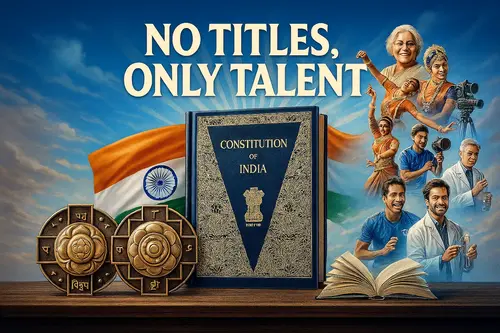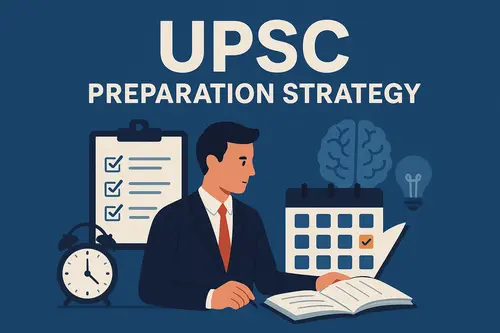
Introduction: Award Season and the Idea of Titles in the Constitution
Each year, the National Film Awards and Dadasaheb Phalke Awards fill the country with pride — rewarding India’s creative genius as well as the spirit of excellence. They honour merit that binds together the cultural and moral fabric of the Republic.
But, isn’t it a fair question to ask — are these not “titles” which Article 18 of the Constitution of India specifically abolishes?
That is a subtle but important distinction to appreciate.
India recognises, rewards and celebrates merit, not ranks or status. Our Constitution does not reject recognition — only inequality. The Padma series or the Phalke Award, etc. do not bestow any levels of status — showing that differentiating recognition does not create “titles”.
“Titles undermine the equality; a republic does not know masters.“
–Dr. B.R. Ambedkar (Constituent Assembly Debates, 1949)
Article 18, India reaffirmed our preference for merit over monarchy, and recognition through service and not through privledge of an entitled status.
Explaining Article 18 – Abolition of Titles
Article 18 in Indian Constitution:
- The state shall not confer any titles but for military or academic purposes.
- No citizen shall accept any title from a foreign State.
- A non-citizen in the service of the State cannot accept a title without the consent of the President of India.
- No one in the service shall accept from a foreign State any emolument or reward.
Central Thought:
The Republic of India was established for the purpose of abolishing the great vestige of imperial knighthoods and titles of “Sir,” “Rai Bahadur,” and “Khan Bahadur” that had created a privileged class above the rest of society.
Article 18 guarantees equality of status and dignity, where no one is considered above the other by virtue of a title.
“It is clear that the idea of a Republic cannot co-exist with titles, which create artificial barriers between people.”
— K. M. Munshi, Member of Constituent Assembly
Therefore, Article 18 is considered more than a legal principle, it is the essence of a Republic and ensures that India will not become a nation of aristocracy but shall be a country of equal citizens.
History of Titles
In colonial India, a title was not a sign of merit — it was used to manipulate and control.
Titles, like “Sir,” “Rai Bahadur,” “Khan Bahadur,” and “Rai Saheb,” were granted to display loyalty to The Crown rather than loyal service to the people of India. Earlier, They elevated their recipient to a level of prestige and commanded their dependence on a foreign Crown — and there was no place for this system in a free democratic India.
Upon becoming a Republic, framers of the Constitution recognized the distinction between respect, and rank.
Dr. B.R. Ambedkar was very clear about this vision, and said, title breaks the very foundation of equality, which is the essence of the Republic.
Consequently, Article 18 was inserted as more than just a constitutional clause, it was a moral proclamation —
In India, honour relates to merit, and not to much ‘decorations’. Therefore, Article 18 encapsulates the ethos of the republic — honour is to be equally bestowed.
Padma Awards and Bharat Ratna – Recognition, Not privilege
Are Padma Awards “Titles”? No. Padma Awards are honours of merit, not badges of superiority.
Established in 1954 and repurposed enumerated the following year as –
- Padma Shri – For distinguished service
- Padma Bhushan – For distinguished service of the highest order
- Padma Vibhushan – For exceptional and distinguished service
These awards are for contributions extending across all fields; of the arts, literature, medicine, science, social service, public affairs, and sports, a fitting embodiment of the diversity of Indian excellence.
“In a democracy, the true aristocracy is of service, not status.”
Unlike their colonial titles in Britain and elsewhere, Padma awards:
- Shall never be allowable to use prefixes in a “honorary” manner, “ex. Not A.R. Rahman, Padma Shri, rather A.R. Rahman, sitting Padma Shri.”
- Shall be published by the government based on the Republic Day, and as announced by the Government is denoting an honour bestowed by the people, not a relic of privilege or monarch as was previously inflicted.
- The awarded titles are actually denoted that they will not be presented again if they are “misapplied” towards asserting social parameters above the rest.
In the case of Balaji Raghavan & Anr. vs. Union of India, the Supreme Court handed down a historic decision: Padma awards and the Bharat Ratna did not violate Article 18. These awards were meant to reward merit and service to the nation—not to confer an aristocratic status.
The Court stated that such awards encourage excellence and public spirit, which fit “comfortably with the constitutional aspiration of equality.”
Bharat Ratna
The judgement underscores that honours, when based on merit, “reinforce democracy” rather than detract from it.
Bharat Ratna – India’s Highest Civilian Honour
The Bharat Ratna, first awarded in 1954, is the highest civilian honour in India —
not as a mark of being “better than,” but as a celebration of service beyond self.
It recognizes “exceptional service of the highest order” in any field of human endeavor — art, public affairs, science, literature, or social reform.
The limit of three awards per year keeps the honour rare, and sets the bar for recognition high.
Great Indians, for instance Dr. B.R. Ambedkar, Mother Teresa, Lata Mangeshkar and A.P.J. Abdul Kalam exemplify the qualities of citizenry that India’s republic demands — their life’s work uplifted millions, not just themselves.
“True greatness needs no prefix; it is its own title.”
The Bharat Ratna is not a “title” in the constitutional sense. It cannot precede a name, nor does it confer social rank.
What it does reinforce, is the message of Article 18, that honour is recognition of contribution, not classification of people.
Famous Judgements Related to Article 18
| Case | Year | Key Takeaways |
|---|---|---|
| Balaji Raghavan & Anr. v. Union of India | 1996 | • Supreme Court upheld Padma Awards’ constitutionality.• Held that awards do not violate Article 18, as they are not hereditary or prefix-based.• Clarified that such honours only recognize public service and excellence. |
| Pratap Singh v. State of Punjab | 1964 | • Reaffirmed that foreign titles or honours cannot be accepted without President’s consent.• Strengthened Article 18(3)–(4) safeguards against external influence. |
| Indira Jaising v. Supreme Court of India | 2017 | • Though not about Padma Awards, Court emphasized that no individual enjoys special privileges or titles in a Republic — reinforcing Article 18’s equality principle. |
Current Relevance: Celebrating Talent, Not Tyranny
Today in India, Article 18 lives in every award conferred for merit — from the Padma Awards, through the National Film Awards, to the Dadasaheb Phalke Award.
- The National Awards announced recently once again remind us that the Republic is celebrating achievement, not aristocracy.
- Artists, scientists, and social workers are honoured not for who their parents are, but for what they have done — true to what the framers of the Constitution set out to achieve.
- To those preoccupied with power and prestige, Article 18 offers a truth that is universal and timeless.
- Respect should be earned, not inherited.
- It teaches that a republic succeeds when recognition is awarded and inspires service, not superiority.
By eliminating titles and honouring achievement, India has negotiated the complicated space of equality and of excellence — of humility and honour.
UPSC relevance
| Category | Details |
|---|---|
| Why Important for UPSC | • Part of Fundamental Rights — Right to Equality (Articles 14–18) .• Frequently asked in Prelims and Mains (GS Paper 2 – Polity). • Connected to meritocracy, governance ethics, and constitutional morality. |
| Previous Year Questions | • UPSC 2019 (Prelims): “Which Article of the Constitution abolishes titles in India?” • UPSC Mains (GS Paper 2): Discuss the constitutional validity of State honours like the Padma Awards in light of Article 18. |
Why Padma Awards Were Abolished Temporarily
| Period | Government / Context | Reason | Outcome |
|---|---|---|---|
| 1978–79 | Morarji Desai Government | Criticism over politicisation and elitism in awards. | Awards suspended temporarily. |
| 1993–1997 | Reconsidered by successive governments | Accusations of favouritism and misuse continued. | Reinstated after Balaji Raghavan (1996) upheld their validity — ensuring awards honour merit, not power. |
Conclusion: Equality with Dignity
“A true republic honours work, not words.”
Article 18 graciously reminds us that dignity is in deeds, not medals or decorations.
Titles may have diminished, but respect is still there – earned by citizens of India who uplift her through their service and excellence.
Article 18 serves as a moral checkpoint to ensure that India remains a democracy based on merit and not privilege or rank.
FAQs on Article 18 of the Indian Constitution
Q1. What does Article 18 of the Indian Constitution deal with?
Article 18 abolishes titles in India to ensure equality and prevent social hierarchies based on privilege.
Q2. Are Padma Awards or Bharat Ratna considered “titles”?
No. They are awards recognizing public service and merit, not hereditary or prefix-based titles.
Q3. Why does the Constitution allow academic and military distinctions?
Because these are earned through study or service, not conferred as marks of superiority.
Q4. Can an Indian citizen accept foreign honours?
Only with the President’s consent, as per Article 18(4).
Q5. What was the Supreme Court’s stand in the Balaji Raghavan case (1996)?
The Court upheld the constitutional validity of Padma Awards, stating they do not violate Article 18.
Q6. How is Article 18 relevant today?
It upholds India’s democratic ethos — recognising merit without encouraging elitism or hierarchy.

